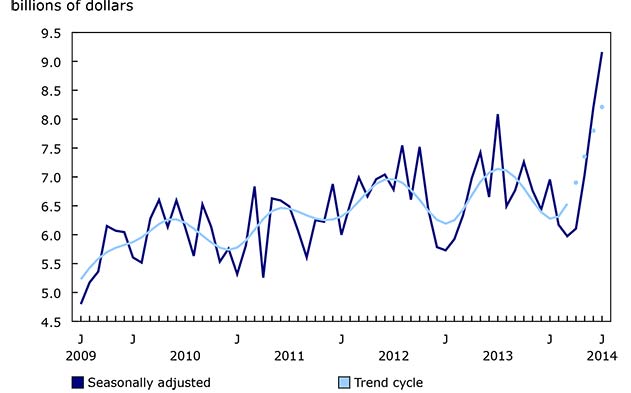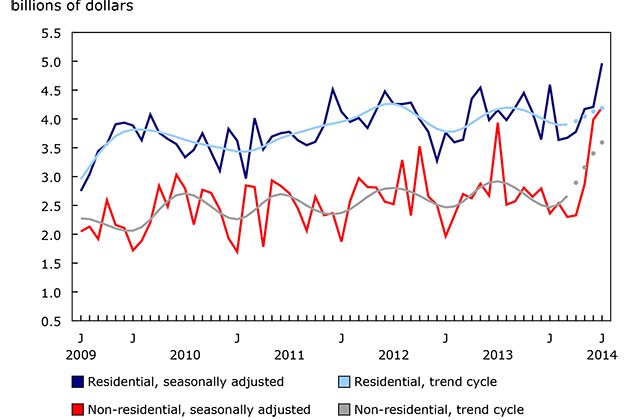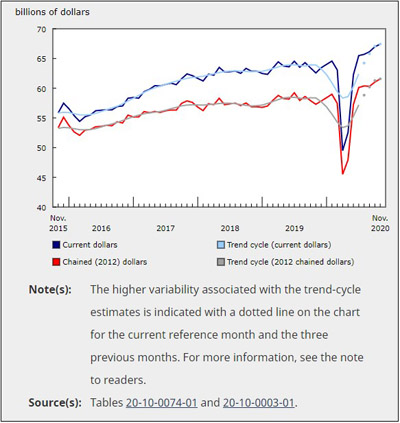Building Permits, July 2014

Canadian municipalities issued building permits worth $9.2 billion dollars in July, up 11.8% from June and the fourth consecutive monthly advance. The increase in July was mainly attributable to higher construction intentions for multi-family dwellings in Ontario and British Columbia as well as institutional buildings in Manitoba.
Chart 1: Total value of permits

Note: the higher variability associated with the trend-cycle estimates is indicated with a dotted line on the chart for the current reference month and the three previous months.
The value of residential building permits increased for the fifth consecutive month, up 18% to $5.0 billion in July. Gains were posted in seven provinces, led by Ontario and BC, with Alberta a distant third. The largest decline occurred in Nova Scotia.
In the non-residential sector, the value of permits rose 5.2% to a record high $4.2 billion. This represents a fourth consecutive monthly increase. Gains were recorded in six provinces, with Manitoba accounting for most of the increase. In contrast, the largest decline occurred in Alberta, followed by Quebec. Both provinces posted large gains the previous month.
Residential sector: significant increase in construction intentions for multi-family dwellings
The value of building permits for multi-family dwellings rose 43.4% to $2.5 billion in July, after a 4.5% decrease the previous month. This gain was primarily the result of higher construction intentions for apartment and apartment-condominium projects in Ontario, BC and, to a lesser extent, Alberta.
Canadian municipalities issued permits for single-family dwellings worth $2.4 billion in July, a slight decrease of 0.5%, after three consecutive monthly increases. The value of single-family dwelling permits declined in five provinces, with the largest decrease occurring in Ontario. Alberta saw the largest increase, followed by Saskatchewan and Nova Scotia.
At the national level, municipalities approved permits for the construction of 20,511 new dwellings, up 21.4% from June. This increase was attributable to multi-family dwellings, which rose 35.2% to 14,050 units. In contrast, the number of single-family dwellings edged down 0.6% to 6,461 units.
Chart 2: Residential and non-residential sectors

Note: the higher variability associated with the trend-cycle estimates is indicated with a dotted line on the chart for the current reference month and the three previous months. See note to readers.
Non-residential sector: large increase in construction intentions for institutional buildings
The value of permits for institutional buildings rose 28.4% to $1.8 billion in July, following a large increase the previous month. This gain was primarily the result of higher construction intentions for medical facilities in Quebec and Manitoba, as well as educational institutions in Alberta.
In the commercial component, the value of building permits rose 2.6% to $1.8 billion in July, following a 2.3% decrease in June. Gains were reported in five provinces, led by Ontario and Quebec. Higher construction intentions for warehouses and, to a lesser degree, retail and wholesale outlets were mainly responsible for the increase at the national level.
Construction intentions for industrial buildings fell 32.6% to $511 million in July, ending a string of three consecutive monthly gains. Lower construction intentions for communication buildings in Quebec and utility buildings in Ontario and Alberta accounted for most of the decline.
Provinces: significant gains in Ontario, BC and Manitoba
The value of permits increased in five provinces, with the largest gain in Ontario, followed by BC and Manitoba.
Most of the gain in Ontario and BC was attributable to multi-family dwellings, while the increase in Manitoba came from the institutional component and, to a lesser extent, the commercial component.
Quebec posted the largest decline, followed by Newfoundland and Labrador and Nova Scotia. The decrease in Quebec was mainly because of a 65.3% decline in construction intentions for industrial buildings. Newfoundland and Labrador’s decrease was attributable to lower construction intentions for commercial buildings, while in Nova Scotia, lower construction intentions for multi-family dwellings were responsible for the decrease.
Higher construction intentions in most census metropolitan areas
In July, the value of building permits was up in 21 of the 34 census metropolitan areas, led by Toronto, Vancouver and Hamilton.
The gain in Toronto was driven by higher construction intentions for multi-family dwellings and, to a lesser extent, institutional buildings. The increase in Vancouver came mainly from multi-family dwellings, while in Hamilton, institutional buildings and multi-family dwellings were responsible for the increase.
The largest declines occurred in Calgary, followed by Kitchener–Cambridge–Waterloo. In Calgary, the decrease was mostly attributable to commercial buildings, while in Kitchener–Cambridge–Waterloo, the decrease was attributable to institutional buildings.
Source: Statistics Canada, http://www.statcan.gc.ca/daily-quotidien/140908/dq140908a-eng.htm?cmp=mstatcan











